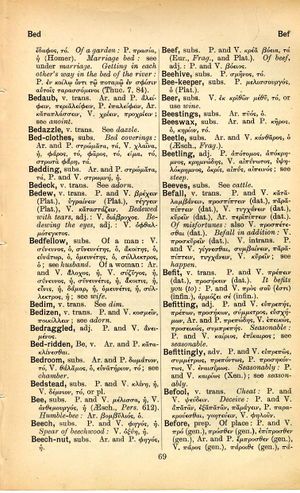bee
ὦ δυσπάλαιστον γῆρας, ὡς μισῶ σ' ἔχων, μισῶ δ' ὅσοι χρῄζουσιν ἐκτείνειν βίον, βρωτοῖσι καὶ ποτοῖσι καὶ μαγεύμασι παρεκτρέποντες ὀχετὸν ὥστε μὴ θανεῖν: οὓς χρῆν, ἐπειδὰν μηδὲν ὠφελῶσι γῆν, θανόντας ἔρρειν κἀκποδὼν εἶναι νέοις → Old age, resistless foe, how do I loathe your presence! Them too I loathe, whoever desire to lengthen out the span of life, seeking to turn the tide of death aside by food and drink and magic spells; those whom death should take away to leave the young their place, when they no more can benefit the world
English > Greek (Woodhouse)
subs.
P. and V. μέλισσα, ἡ, V. ἀνθεμουργός, ἡ (Aesch.. Pers. 612).
Humble-bee: Ar. βομβυλιός, ὁ.
Latin > English (Lewis & Short)
bee:
I the sound made by a sheep, Varr. R. R. 2, 1, 7; cf. balo.
Latin > French (Gaffiot 2016)
bee, ind., onomatopée reproduisant le bêlement des moutons : Varro R. 2, 1, 7.

